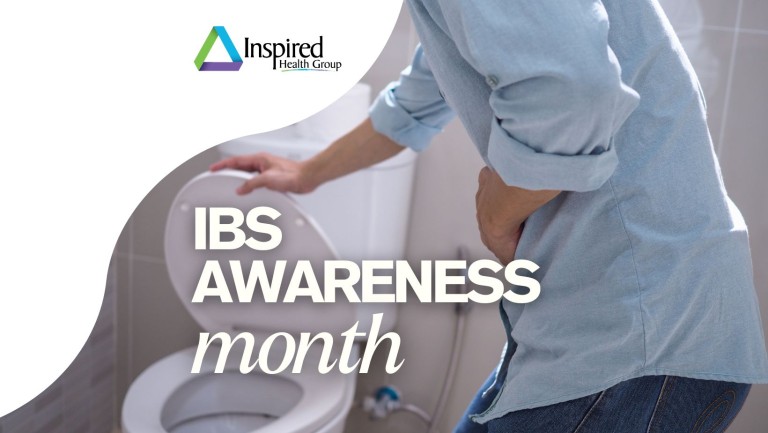IBS affects up to 45 million people in the United States alone. Inspired Health Group, Physician Assistant, Valerie McDonald, raises awareness of IBS symptoms, treatment & management to help improve quality of life for those suffering from this disorder.
April is Irritable Bowel Syndrome (IBS) Awareness Month and if you have IBS, you are not alone. IBS affects 10-15% of people, and likely more, as may people remain undiagnosed and unaware that their symptoms indicate a medical disorder. Patients can be misunderstood and stigmatized due to this disorder, with their symptoms having a significant impact on quality of life.
Symptoms of IBS:
There are currently no diagnostic tests for IBS, and it has typically been known as a diagnosis of exclusion. Symptoms associated with IBS include:
- recurring or chronic bouts of abdominal pain/discomfort
- abdominal pain/discomfort associated with a change in bowel habits including diarrhea and/or constipation
- bloating
- gas
- urgency.
These symptoms can flare up unexpectedly and change over time, sometimes day to day. IBS does not cause physical damage, celiac disease or increase the risk of colon cancer or inflammatory bowel disease; although those conditions can coexist with IBS.
Alarming "Red Flag" Symptoms
It is important to factor in your personal risk for those conditions as well as recognize “alarm or red flag symptoms.” Alarming symptoms include:
- bowel changes/symptom onset at age 50 or older
- symptoms that awaken you at night
- unintentional weight loss
- recent use of antibiotic associated diarrhea
- blood in the stool
Bleeding which tends to be the most alarming symptom sometimes turns out to be unalarming after all, but it is important to let your Inspired Health Group provider know. Small amounts of bright red blood usually are from a hemorrhoid or fissure, which is a small tear in the anal passage. Large amounts of red blood or black, tarry stools should be addressed immediately.
IBS Treatment:
Overall IBS treatment should begin with education about the disorder, with the mainstay of treatment being lifestyle changes. The use of a food and symptom diary can be very beneficial, identifying possible triggers as well as trends in your illness. Record this diary for 2-4 weeks and bring it to your appointment to go over with your provider. Typically, once triggers are identified, diet changes can greatly improve IBS symptoms. An appointment with an IHG nutritionist can be very helpful. They can assist in completing an elimination diet as well as recommend beneficial supplements including pre and probiotics and digestive enzymes.
Biofeedback, relaxation techniques, stress management, good sleep hygiene and exercise are also ways to help manage IBS. Cognitive behavioral therapy and medical drug therapy can be used for moderate to severe symptoms frequently affecting a patient’s daily life.
Just know that if you are suffering from IBS, you are not alone and do not have to suffer! We are here to help. Contact your IHG care team today If you are experiencing IBS symptoms.

